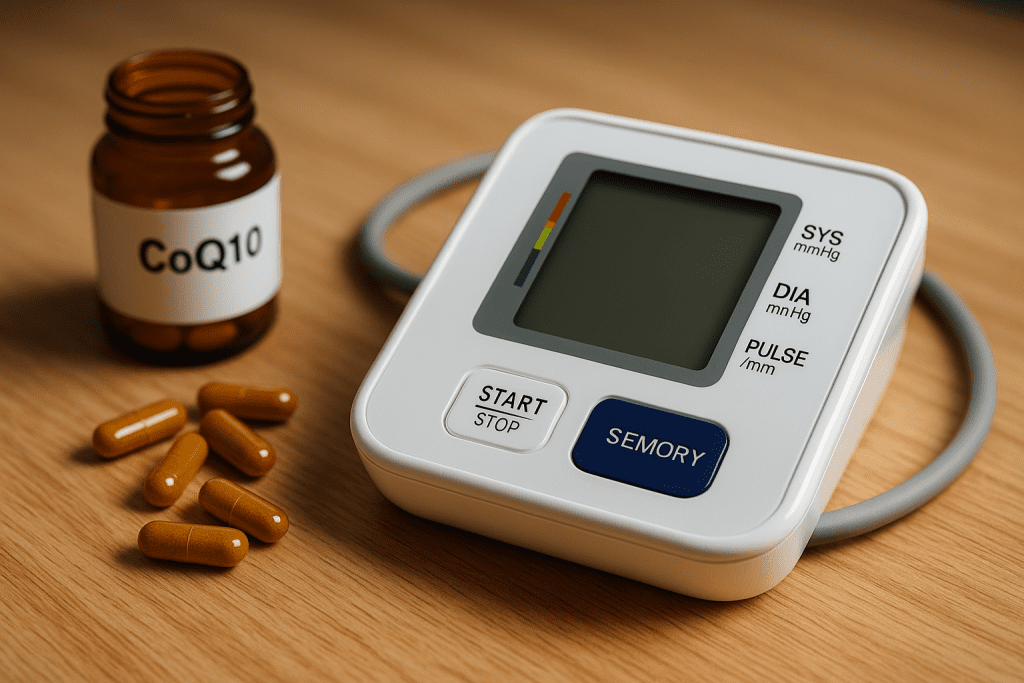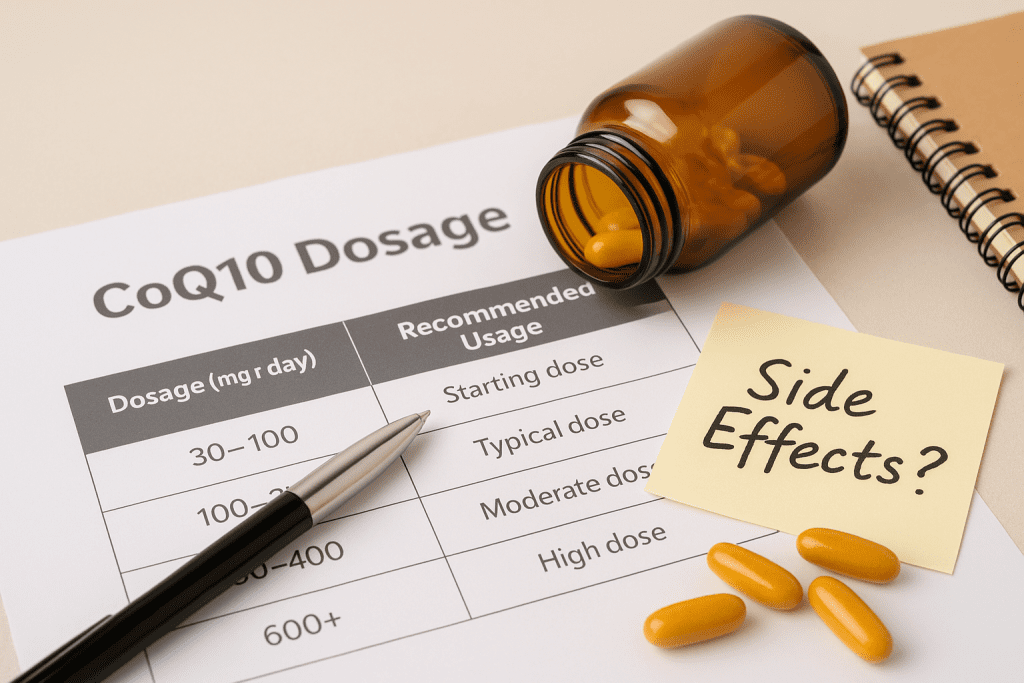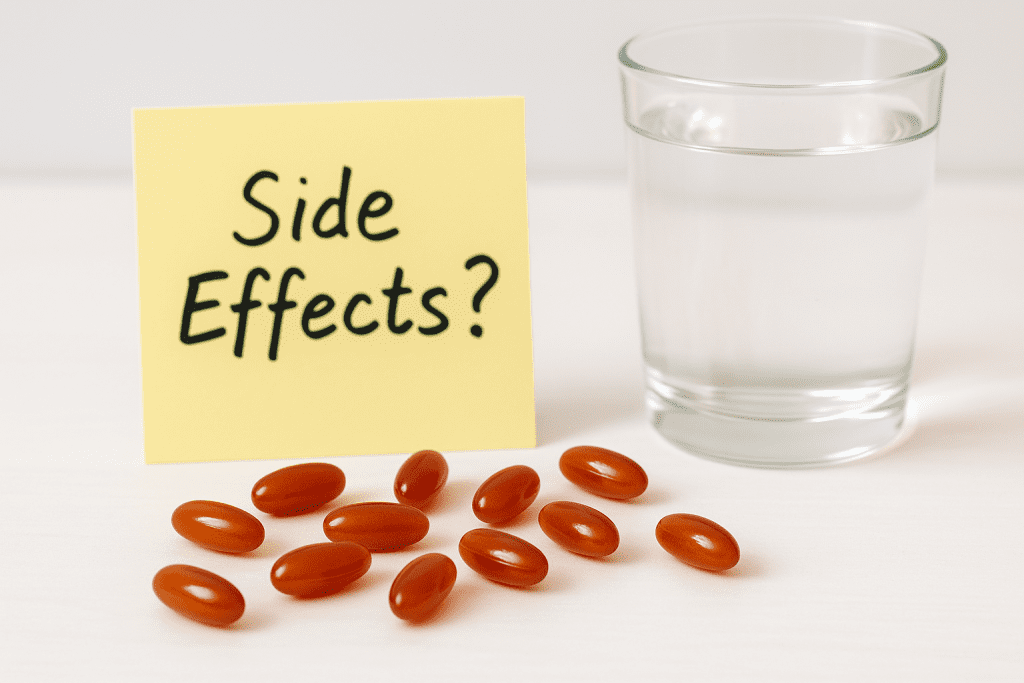
Can You Take CoQ10 with Blood Pressure Medication? Here’s What You Need to Know
If you’re managing high blood pressure, you may have heard that Coenzyme Q10 (CoQ10) can help—but is it safe to combine with your medication? This guide explores how CoQ10 affects blood pressure, whether it interacts with common hypertensive drugs, and what overdose risks look like. Backed by clinical research, we’ll walk through the evidence on dosage, safety, and best practices.
Quick Summary: CoQ10 + Hypertension Medication
| Question | Quick Answer |
|---|---|
| Is CoQ10 safe with blood pressure meds? | Yes, generally—but monitor for additive effects |
| Typical dosage range | 100–200 mg daily (safe for most adults) |
| High-dose safety | Up to 1,200 mg/day shown to be well-tolerated |
| Documented interactions | Minimal, but can enhance BP-lowering effects |
| Overdose symptoms | Mostly mild: GI upset, dizziness, fatigue |
| Need to consult a doctor? | Always, especially if taking multiple meds |
CoQ10 and Its Impact on Blood Pressure
Coenzyme Q10 is a fat-soluble antioxidant found naturally in the body, particularly in heart and liver cells. It plays a central role in mitochondrial energy production and oxidative balance. Research shows that supplementing with CoQ10 can significantly reduce both systolic and diastolic blood pressure, making it a popular adjunct therapy for hypertension.
In one Journal of Human Hypertension trial, patients taking 225 mg/day of CoQ10 saw such improvement that 37% were able to discontinue at least one antihypertensive drug. This suggests CoQ10 may have a synergistic or additive effect when combined with prescription blood pressure medications.
However, that benefit comes with a caveat: if you’re already on medications like ACE inhibitors or beta blockers, combining them with CoQ10 could potentially lower your blood pressure more than intended.
When Additive Effects Become a Concern
This potential for enhanced blood pressure reduction underscores the importance of regular monitoring. While CoQ10 is not known to cause abrupt drops in blood pressure on its own, its interaction with antihypertensive medications may require dose adjustments. For instance, Coenzyme Q10 and perindopril showed no direct harmful interactions, but overlapping mechanisms mean effects could be magnified.
If you’re already supplementing or considering it, the best app for tracking vitamin and drug interactions can help you stay on top of changes and side effects.
Safe Dosage Guidelines for CoQ10 with BP Medications
CoQ10 dosage varies widely depending on the intended use, but for blood pressure support, most studies recommend 100–200 mg per day. This range appears to offer an effective therapeutic dose with minimal risk.
Higher dosages, such as 300–400 mg daily, have been used in clinical trials to target inflammation and improve lipid profiles. Safety assessments published in PubMed Central and other scientific outlets have shown that even doses up to 1,200 mg/day are well-tolerated in adults.
| Dosage | Safety Notes |
| 100–200 mg/day | Clinically effective and well-tolerated for hypertension |
| 300–400 mg/day | Used in research; consult physician for higher dosing |
| Up to 1,200 mg/day | Observed Safety Level (OSL) with long-term use |
| Above 1,200 mg/day | Studied for other conditions, but not standard |
Always start with a lower dose (e.g., 50–100 mg/day), especially if you’re combining CoQ10 with antihypertensives. Gradually increasing the dosage under medical supervision ensures safety and effectiveness.
Interaction Risks: What to Watch Out For

While CoQ10 is largely safe to combine with antihypertensives, understanding the nuance of “supplement and BP meds interaction” is critical. According to Drugs.com, no major interactions exist between CoQ10 and commonly prescribed medications like lisinopril or metoprolol. Still, that doesn’t mean there’s zero impact.
Some interactions might be pharmacodynamic rather than pharmacokinetic. That means the effect on blood pressure may be enhanced without the two compounds directly interfering in the body’s metabolism or absorption processes.
Other medications that may warrant extra caution include:
- Calcium channel blockers (e.g., diltiazem)
- Diuretics (especially when paired with licorice root supplements and diuretic depletion)
- ARBs and beta blockers (e.g., irbesartan, bisoprolol)
When in doubt, always check for updated interactions using a trusted source or interaction checker app.
CoQ10 Overdose Risk: What the Evidence Shows
CoQ10 has an excellent safety record, even at high doses. In multiple trials, including those cited by the European Food Safety Authority and PubMed, the risk of toxicity was extremely low. The Acceptable Daily Intake (ADI) is estimated at 12 mg/kg/day, which equates to about 840 mg/day for a 70 kg adult.
However, exceeding standard dosages can increase the risk of mild side effects. These may include:
Common Side Effects
- Digestive issues: nausea, diarrhea, stomach upset
- Neurological symptoms: headaches, fatigue, dizziness
- Other: insomnia, skin rashes, drop in blood pressure
Many of these symptoms are dose-dependent and often resolve after discontinuing or adjusting the dose. Interestingly, similar complaints have been recorded in placebo groups, as reported in Drugs.com and Healthline.
Signs You May Be Taking Too Much CoQ10
If you notice any of the following, consult a healthcare provider immediately:
- Unexplained fatigue or insomnia
- Light-headedness or fainting
- Persistent stomach discomfort
- Lower-than-normal blood pressure readings
Tracking symptoms alongside supplementation can make a huge difference. A good symptom logger for drug-nutrient side effects helps identify early warning signs.
Final Thoughts: CoQ10 and Blood Pressure Medications Can Work Together Safely

CoQ10 is a powerful tool in the heart health toolkit, especially for those managing hypertension. When taken responsibly, it may even enhance the effects of traditional blood pressure medications and support dosage reduction under medical guidance.
But even natural supplements can carry risks. The key is precision: right dose, right context, and ongoing supervision. With its low toxicity and promising cardiovascular benefits, CoQ10 can be safely integrated into most hypertension treatment plans—as long as your doctor is in the loop.
Want to learn more about vitamin and medication interactions? Explore our guide on potassium supplements and ACE inhibitor dangers.


Pingback: Heart Failure Supplement Contraindications [Expert Guide] | Useful Vitamins